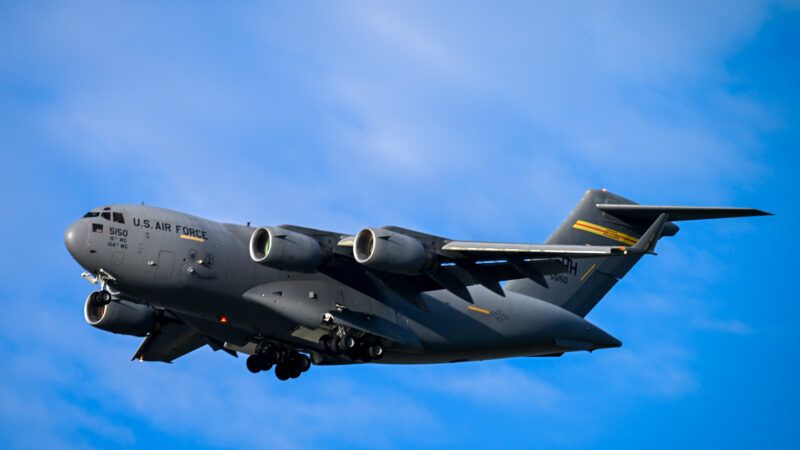Pentagon Paid Nearly 8,000 Percent Markup on Boeing's Bathroom Soap Dispenser
The Air Force paid nearly $150,000 above market value for airplane bathroom fixtures, a Department of Defense watchdog found.

The bathroom on the C-17 Globemaster III cargo plane is nothing special. The soap dispensers are exactly the same kind of pump that customers might find on a civilian airliner or in a restaurant bathroom. But the U.S. government paid 7,943 percent more for the soap machines than what it should have, costing taxpayers $149,072, a new report by the Office of the Inspector General at the Department of Defense found.
The report was the result of a two-year audit of U.S. Air Force purchases from the Boeing Company. Out of a selected sample of 46 spare parts for the C-17, the Pentagon's internal watchdog found that the Air Force overpaid for 12 of them, costing taxpayers an additional $992,856 on top of the parts' $4.3 million value.
The C-17 is the workhorse of U.S. military airlifts. Capable of carrying heavier loads over longer distances than any other aircraft in the American arsenal, the transport jet has become a symbol of U.S. resupply efforts for Israel and Ukraine. The U.S. Air Force maintains a fleet of 223 of them.
Overcharging is a massive problem for the U.S. military budget. In 2015, the Pentagon found that it was severely overpaying for Patriot missiles, and negotiated a new contract that saved $550 million. In 2019, the inspector general found that the military was paying $4,300 for a half-inch metal drive pin that should have cost $46.
The similarly extreme markup on soap dispensers is what led to the audit of C-17 parts in the first place. The Office of the Inspector General says that it opened its investigation in June 2022 after a whistleblower told its anonymous tip line that Boeing was severely overcharging for airplane bathroom fixtures.
The inspector general found that the Air Force did not "validate the accuracy of the data used for contract negotiation, conduct contract surveillance to identify price increases during contract execution, or review invoices to determine fair and reasonable prices before payment."
Boeing cooperated with the investigation on the condition that specific price data would not be released to Congress or the public, arguing that this data is a trade secret. Therefore, the inspector general report only includes the total extra cost of the soap dispensers, not the number that the Air Force purchased or how much Boeing charged for each one.
A commercial soap dispenser costs around $30 online. (The inspector general report emphasizes that the C-17's bathroom soap dispensers are "identical" in function to soap dispensers in "a residential kitchen or bathroom, commercial restaurant bathrooms, or in an aircraft lavatory.") An 8,000 percent markup means that the Air Force potentially paid thousands of dollars for each one.
Even worse than the bathroom incident, the Air Force overpaid $293,632.74 on retaining bands, the report found. Other parts that were marked up included bearings, screws, gaskets, lights, and even tape, which the inspector general says Boeing overcharged $2,664.84 for. The inspector general found that the Pentagon had trouble catching overcharging because officials "would not question the costs if they matched what Boeing paid" its suppliers.
"We are reviewing the report, which appears to be based on an inapt comparison of the prices paid for parts that meet aircraft and contract specifications and designs versus basic commercial items that would not be qualified or approved for use on the C-17," Boeing spokeswoman Nicola Hammond tells Reason. "We will continue to work with the [Office of the Inspector General] and the U.S. Air Force to provide a detailed written response to the report in the coming days."
In an interview with 60 Minutes last year, former Raytheon Contract Negotiator and Pentagon Director of Defense Pricing Shay Assad blamed a lack of competition for the rampant price increases.
"In the '80s, there was intense competition amongst a number of companies. And so the government had choices. They had leverage," he said. "We have limited leverage now."


Show Comments (62)